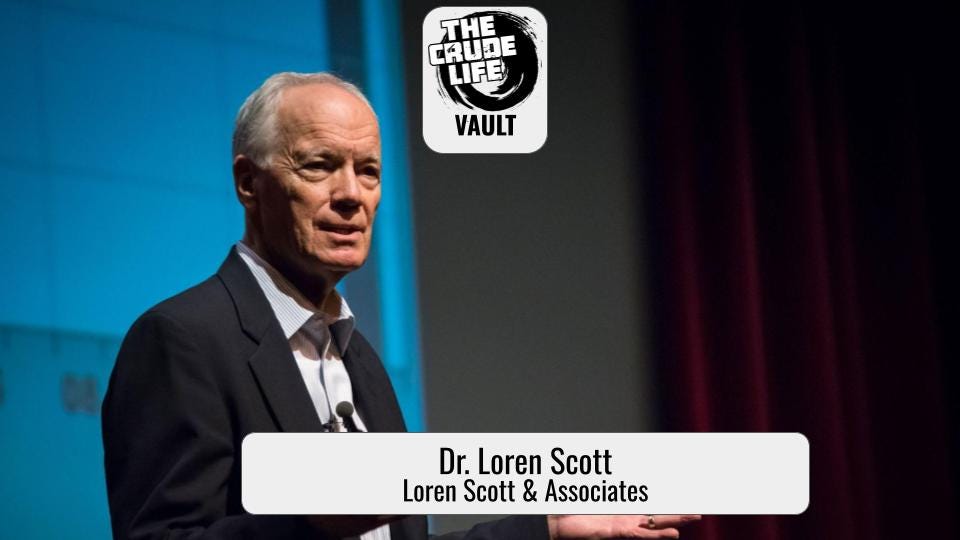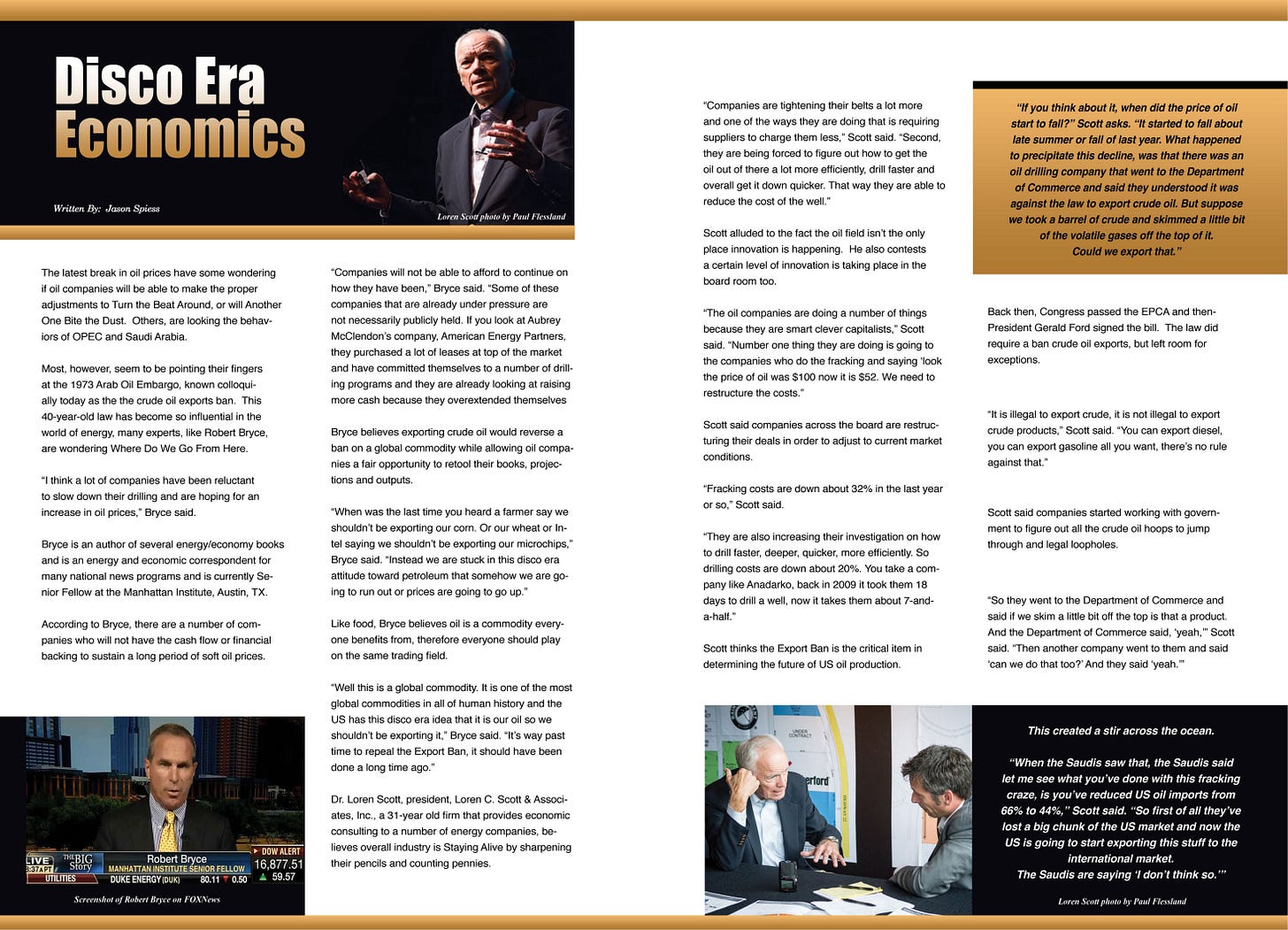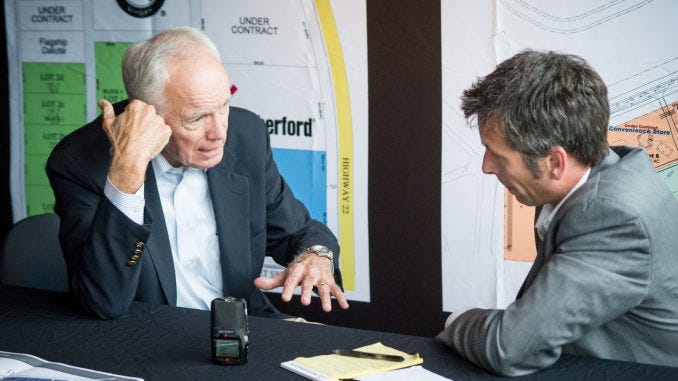(Interview and feature article from 2018) - The latest break in oil prices have some wondering if oil companies will be able to make the proper adjustments to Turn the Beat Around, or will Another One Bite the Dust. Others, are looking the behaviors of OPEC and Saudi Arabia.
Most, however, seem to be pointing their fingers at the 1973 Arab Oil Embargo, known colloquially today as the the crude oil exports ban. This 40-year-old law has become so influential in the world of energy, many experts, like Robert Bryce, are wondering Where Do We Go From Here.
"I think a lot of companies have been reluctant to slow down their drilling and are hoping for an increase in oil prices," Bryce said.
Bryce is an author of several energy/economy books and is an energy and economic correspondent for many national news programs and is currently Senior Fellow at the Manhattan Institute, Austin, TX.
According to Bryce, there are a number of companies who will not have the cash flow or financial backing to sustain a long period of soft oil prices.
"Companies will not be able to afford to continue on how they have been," Bryce said. “Some of these companies that are already under pressure are not necessarily publicly held. If you look at Aubrey McClendon's company, American Energy Partners, they purchased a lot of leases at top of the market and have committed themselves to a number of drilling programs and they are already looking at raising more cash because they overextended themselves."
Bryce believes exporting crude oil would reverse a ban on a global commodity while allowing oil companies a fair opportunity to retool their books, projections and outputs.
"When was the last time you heard a farmer we shouldn't be exporting our corn. Or our wheat or Intel saying we shouldn't be exporting our microchips," Bryce said. "Instead we are stuck in this disco era attitude toward petroleum that somehow we are going to run out or prices are going to go up.”
Like food, Bryce believes oil is a commodity everyone benefits from, therefore everyone should play on the same trading field.
“Well this is a global commodity. It is one of the most global commodities in all of human history and the US has this disco era idea that it is our oil so we shouldn't be exporting it,” Bryce said. “It's way past time to repeal the Export Ban, it should have been done a long time ago."
Dr. Loren Scott, president, Loren C. Scott & Associates, Inc., a 31-year old firm that provides economic consulting to a number of energy companies, believes overall industry is Staying Alive by sharpening their pencils and counting pennies.
"Companies are tightening their belts a lot more and one of the ways they are doing that is requiring suppliers to charge them less," Scott said. "Second, they are being forced to figure out how to get the oil out of there a lot more efficiently, drill faster and overall get it down quicker. That way they are able to reduce the cost of the well."
Scott alluded to the fact the oil field isn’t the only place innovation is happening. He also contests a certain level of innovation is taking place in the boardroom too.
"The oil companies are doing a number of things because they are smart clever capitalists," Scott said. "Number one thing they are doing is going to the companies who do the fracking and saying 'look the price of oil was $100 now it is $52. We need to restructure the costs."
Scott said companies across the board to restructuring their deals in order to adjust to current market conditions.
"Fracking costs are down about 32% in the last year or so," Scott said. "They are also increasing their investigation on how to drill faster, deeper, quicker, more efficiently. So drilling costs are down about 20%. You take a company like Anadarko, back in 2009 it took them 18 days to drill a well, now it takes them about 7-and-a-half.”
Scott thinks the Export Ban is the critical item in determining the future of US oil production.
"If you think about it, when did the price of oil start to fall?" Scott asks. "It started to fall about late summer or fall of last year. What happened to precipitate this decline, was that there was an oil drilling company that went to the Department of Commerce and said they understood it was against the law to export crude oil. But suppose we took a barrel of crude and skimmed a little bit of the volatile gases off the top of it. Could we export that."
Back then, Congress passed the EPCA and then-President Gerald Ford signed the bill. The law did require a ban crude oil exports, but left room for exceptions.
"It is illegal to export crude, it is not illegal to export crude products," Scott said. "You can export diesel, you can export gasoline all you want, there's no rule against that."
Scott said companies started working with government to figure out all the crude oil hoops to jump through and legal loopholes.
"So they went to the Department of Commerce and said if we skim a little bit off the top is that a product. And the Department of Commerce said, 'yeah,'" Scott said. "Then another company went to them and said 'can we do that too?' And they said 'yeah.'"
This created a stir across the ocean.
"When the Saudis saw that, the Saudis said let me see what you've done with this fracking craze, is you've reduced US oil imports from 66% to 44%," Scott said. "So first of all they've lost a big chunk of the US market and now the US is going to start exporting this stuff to the international market. The Saudis are saying 'I don't think so.'"
(Interview and feature article from 2018)
Loren C. Scott & Associates, Inc., is a 35-year old firm that provides economic consulting and public speaking services for a wide range of clients. Consulting activities include impact studies, forecasting services, analysis of policy proposals, and general economic analyses. Consulting clients include BP, ExxonMobil, Entergy Corporation, J. P. Morgan Chase, Capital One Financial, Nucor, Sasol, and a diversity of others. Our objective is to put together the very best team of associates to attack our client’s problems. Dr. Scott makes 50-70 presentations a year on the state of---and the outlook for---the economy and the energy sector in particular.
He is one of the 32-member National Business Economic Issues Council, which meets quarterly to discuss issues of state, national, and international interest. This group has experts who cover international trade, Washington economic policy, retail trade, trucking, steel, chemicals, etc. Dr. Scott is an energy specialist on the NBEIC. He has been appointed to the Economic Advisory Board of the U.S. Council on Competitiveness---a group made up of the CEOs of the Fortune 100, top university presidents, and presidents of three major unions.
He has been interviewed on MSNBC, CNBC, Bloomberg TV, and several local TV stations and his work has been cited in such publications as the Wall Street Journal, the Financial Times, USA Today, the Los Angeles Times and the Moscow Times, to name a few.
Dr. Loren C. Scott is President and founder of the firm. He was on the Economics Department faculty at Louisiana State University from 1969 to 1998, where he rose through the ranks from Assistant Professor to the holder of the Freeport-McMoran endowed Chair of Economics. He is presently Professor Emeritus of Economics at LSU.
Over the thirteen-year period from 1983-96, Dr. Scott was the chairman of
the Economics Department at LSU. During that time, the Department’s ranking
among the 3,000 economics departments in the U.S. rose from 101st to 38th.
He received 7 awards at LSU for outstanding classroom teaching.
Dr. Scott is co-developer of the Louisiana econometric model, a model used for providing annual forecasts of the Louisiana economy, which are released each fall. He was a co-investigator on over $1 million in grant research at LSU and is the author of over 75 articles and technical reports in addition to reports written for consulting clients.
Everyday your story is being told by someone. Who is telling your story? Who are you telling your story to?
Email your sustainable story ideas, professional press releases or petro-powered podcast submissions to thecontentcreationstudios(AT)gmail(DOT)com.
#thecrudelife promotes a culture of inclusion and respect through interviews, content creation, live events and partnerships that educate, enrich, and empower people to create a positive social environment for all, regardless of age, race, religion, sexual orientation, or physical or intellectual ability.
CLICK HERE FOR SPECIAL PARAMOUNT + DISCOUNT LINK
Don't miss out! Stream College Basketball on CBS live with the Paramount+ with SHOWTIME plan.
Start Streaming Today!



















Share this post